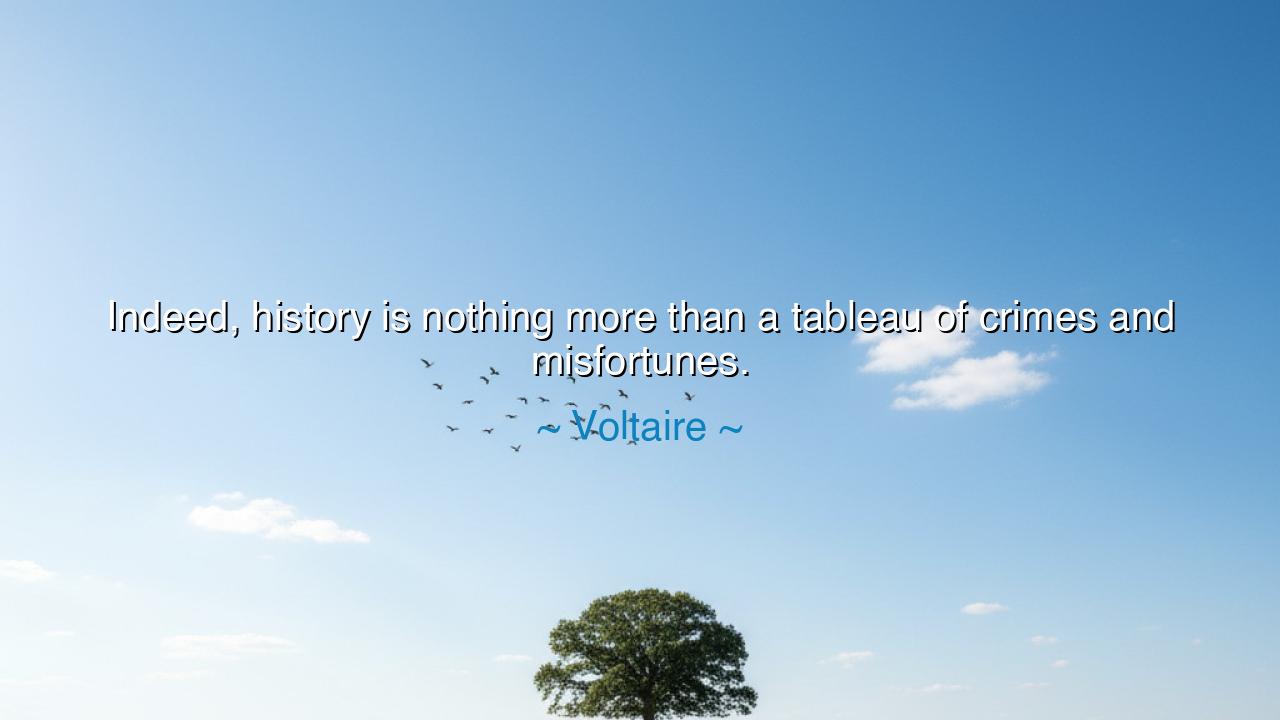
Indeed, history is nothing more than a tableau of crimes and






The great philosopher of the Enlightenment, Voltaire, once wrote with a sigh that echoed across the centuries: “Indeed, history is nothing more than a tableau of crimes and misfortunes.” In this grim yet truthful declaration, he stripped away the grandeur with which men often adorn their past and revealed its darker heart. For Voltaire, that tireless critic of tyranny and superstition, history was not a tale of glory, but a long chronicle of human folly — a gallery of suffering, ambition, betrayal, and blood. His words remind us that beneath the banners and monuments, beneath the songs of kings and conquerors, lie the cries of the forgotten, the defeated, and the betrayed.
The origin of this thought arises from the age in which Voltaire lived — the eighteenth century, when reason began to challenge tradition, and philosophers dared to question the justice of history itself. Europe was still scarred by centuries of war, by the cruelty of monarchs, and by the intolerance of religious persecution. Voltaire, who had seen men burned at the stake for their beliefs and nations bled dry by the pride of their rulers, came to see history as a mirror of human corruption. He wrote not as a cynic, but as a witness — one who longed for wisdom yet found only endless repetition of the same tragedies, painted anew upon the canvas of time.
What, then, did Voltaire mean by calling history a “tableau of crimes and misfortunes”? He meant that when we look upon the vast mural of the past, what we see are not merely the triumphs of civilization, but the wreckage upon which those triumphs were built. Every empire that has risen did so upon the bones of others; every progress in science or art has been shadowed by violence or greed. The tableau — that grand painting of human existence — is beautiful from afar, but up close it reveals the brushstrokes of cruelty and sorrow. It is both art and accusation, both memory and warning.
Consider, for example, the conquest of the Americas. To some, it is a tale of discovery — ships crossing unknown seas, bringing together two halves of the world. But to others, it is a story of crimes and misfortunes: of nations erased, cultures annihilated, and millions enslaved or slain in the name of progress. The conquistadors, hailed by their own people as heroes, were to the native civilizations instruments of ruin. And yet, from that ruin, a new world emerged — proof that history is a paradox, both creative and destructive, both majestic and monstrous. Voltaire saw this contradiction and refused to turn away from it. He demanded that humanity confront the cost of its own ambition.
In his time, Voltaire had also lived through the Lisbon earthquake of 1755, a catastrophe that destroyed an entire city and shook the faith of Europe. Thousands perished, the innocent and the guilty alike. The philosophers of the day struggled to reconcile such suffering with the belief in divine order. Voltaire, ever the realist, saw in it another testament to his grim observation: that misfortune is not the exception, but the rule of human life. His poem on the disaster does not seek comfort; it asks only that we open our eyes and see the world as it is — not as we wish it to be. For to deny the pain of history is to repeat it.
Yet, though Voltaire’s words seem heavy with despair, they carry a deeper wisdom. To recognize that history is filled with crimes is not to lose faith in humanity — it is to awaken. For only those who see the darkness can truly seek the light. Voltaire’s insight is a call to consciousness: to remember that behind every tale of victory lies the suffering of those unheard. If we can learn from their pain — if we can make of remembrance a form of justice — then perhaps history need not remain only a tableau of sorrow, but may become a mirror of redemption.
Let this be the lesson that endures: do not glorify the past blindly, nor despair over its cruelty, but understand it. Study it not as a record of power, but as a record of consequence. Every cruelty repeated today was once committed yesterday; every war began as a forgotten grievance; every tyranny grew from silence. Thus, the wise do not turn away from the crimes and misfortunes of history — they face them, and in facing them, they rise above them.
So, my children of this restless age, when you gaze upon the mural of human history, do not look only at the crowns and triumphs. Look also at the shadows beneath them — for there, in those shadows, lies the truth of our nature. And remember Voltaire’s warning: if we forget that history is a tableau of crimes and misfortunes, we risk painting it again, in the same colors of suffering. But if we remember — if we learn — then from that dark canvas we may yet paint a brighter dawn.






AAdministratorAdministrator
Welcome, honored guests. Please leave a comment, we will respond soon